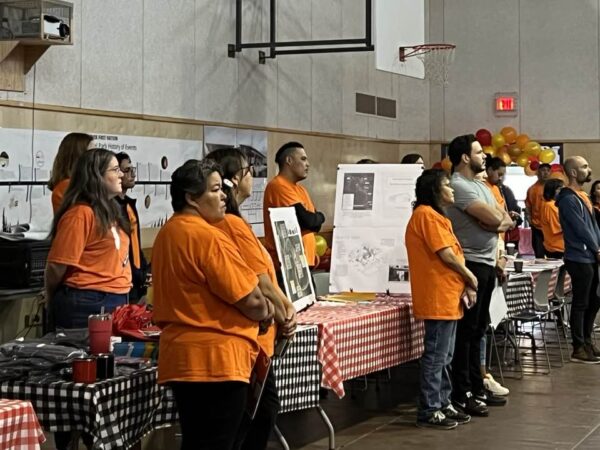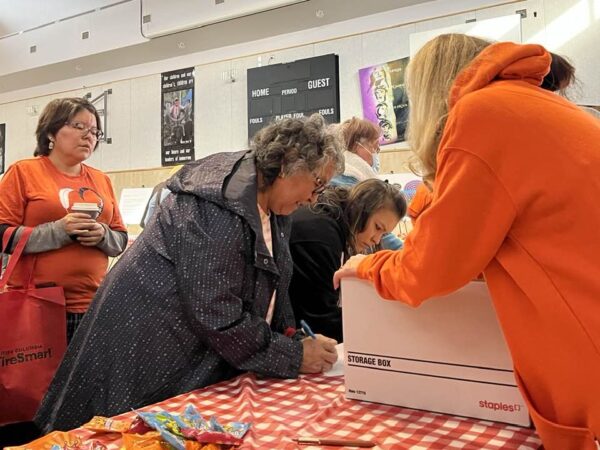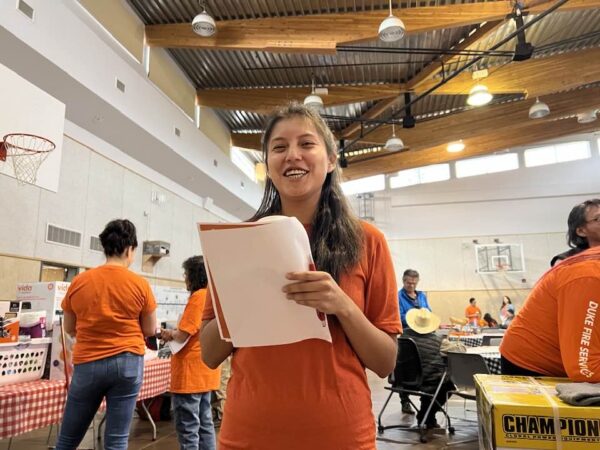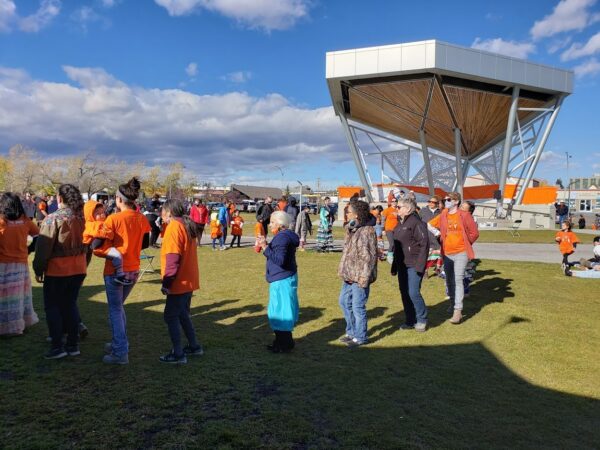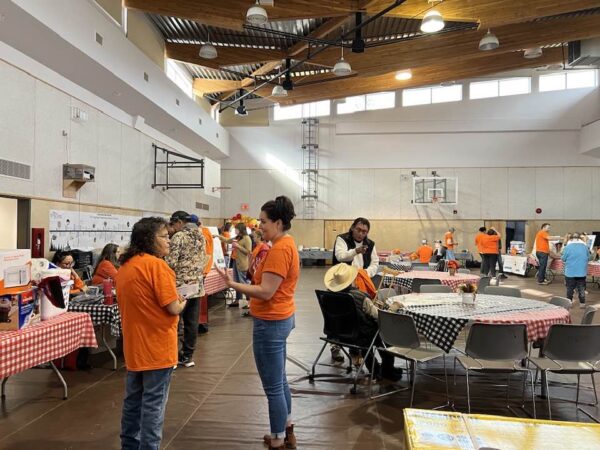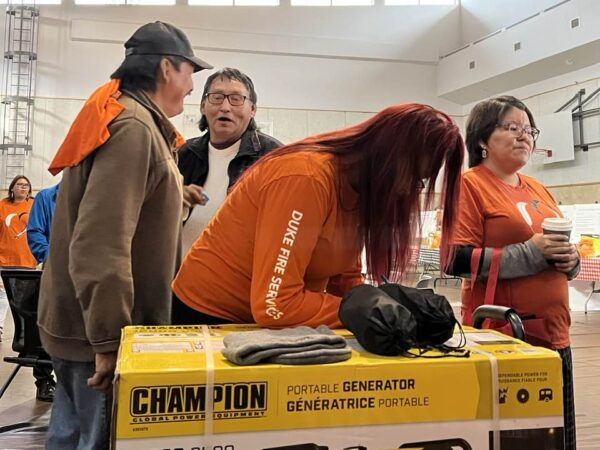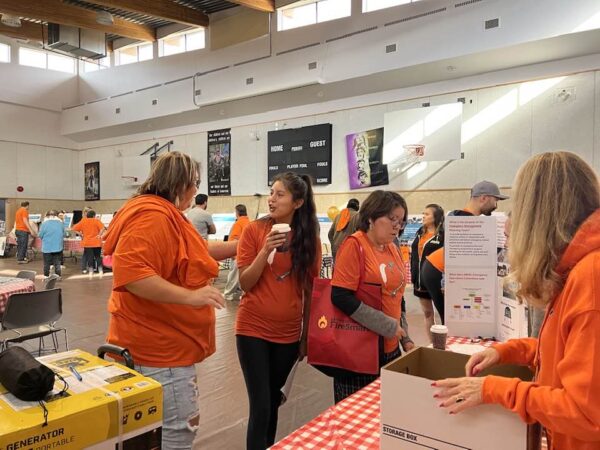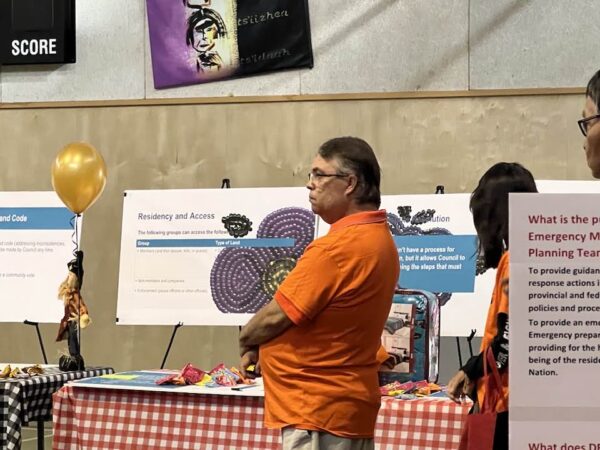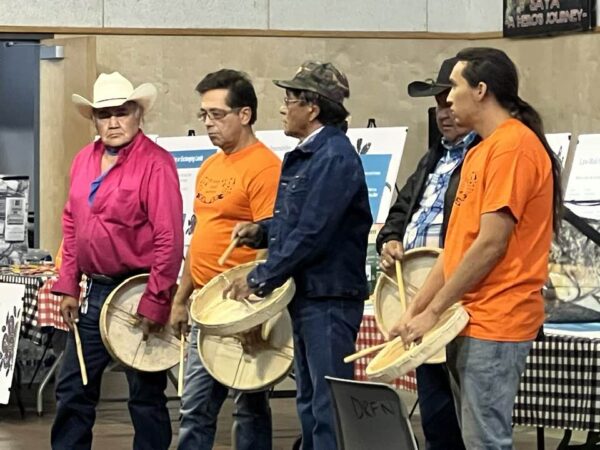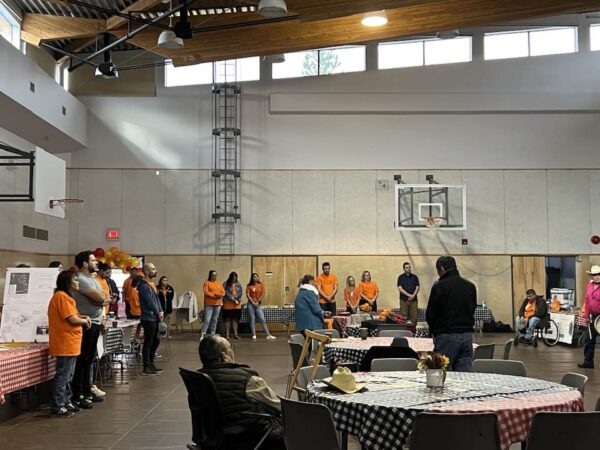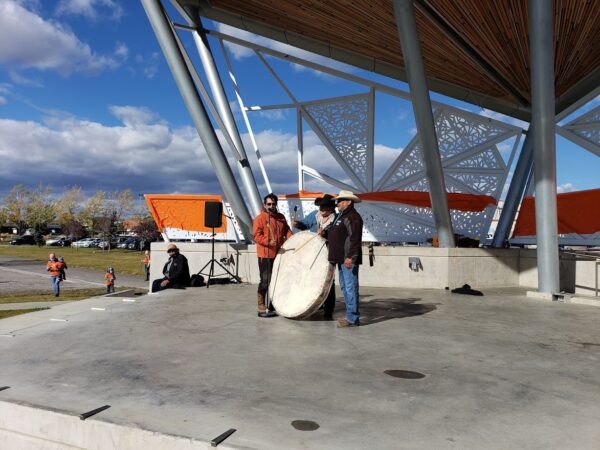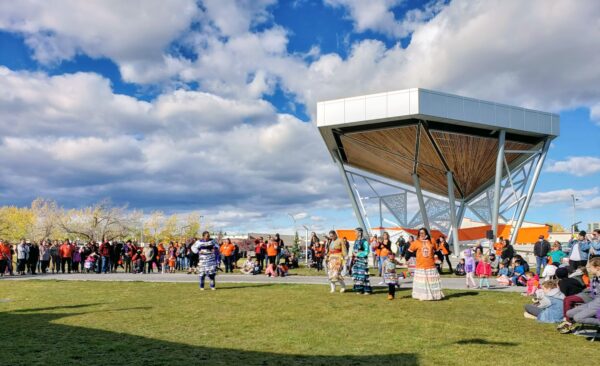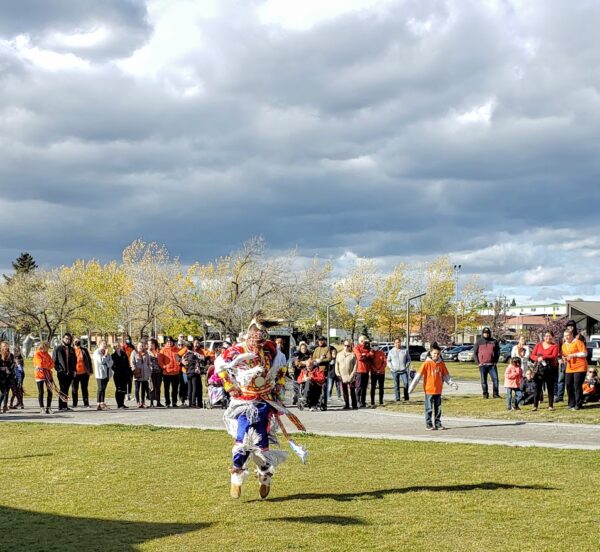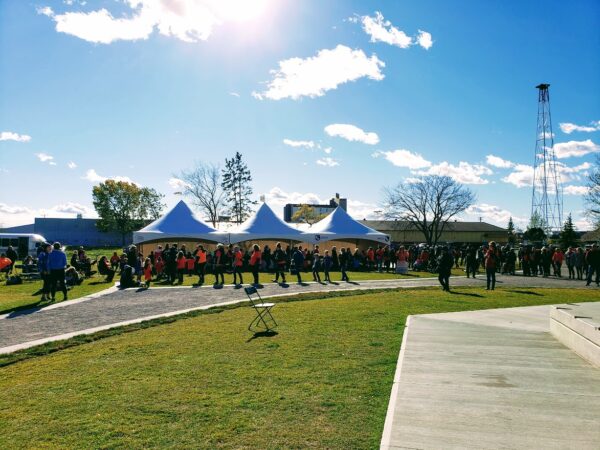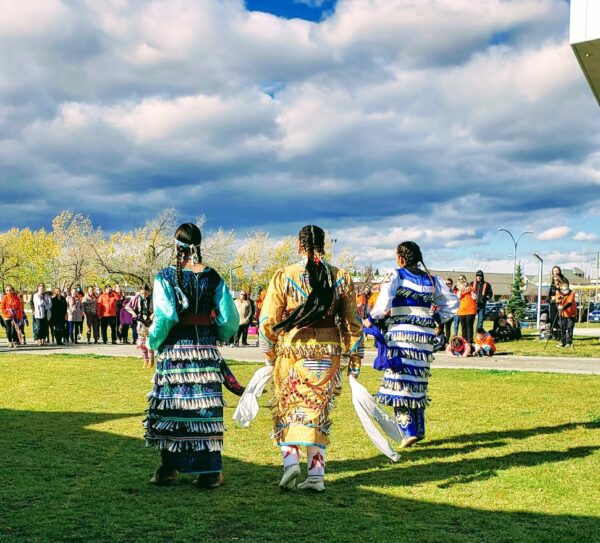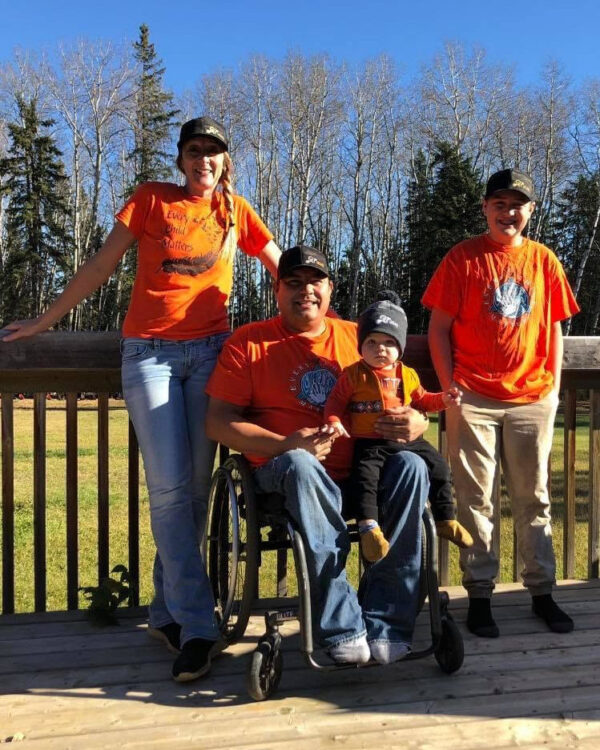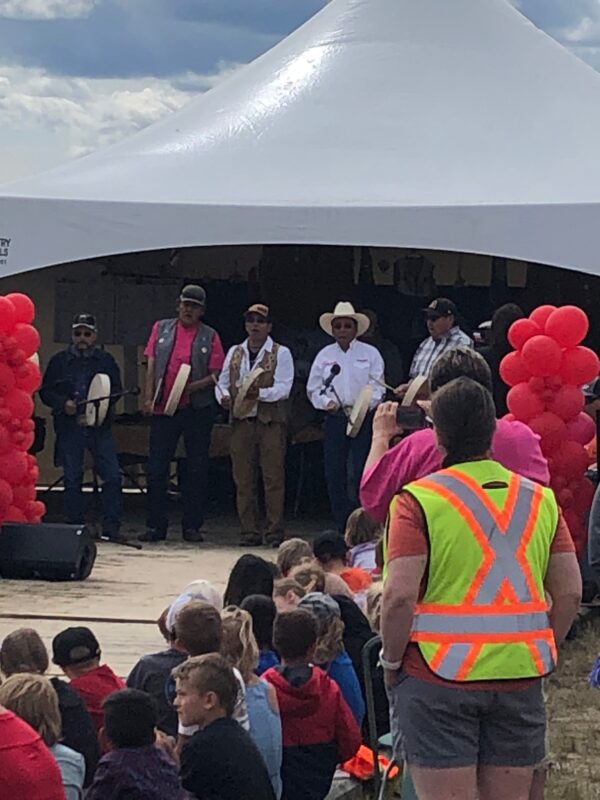DRFN is an active community that enjoys participating in a number of annual events that are celebrated throughout the country. These events provide an opportunity to acknowledge and support shared interests and values with Canadians.
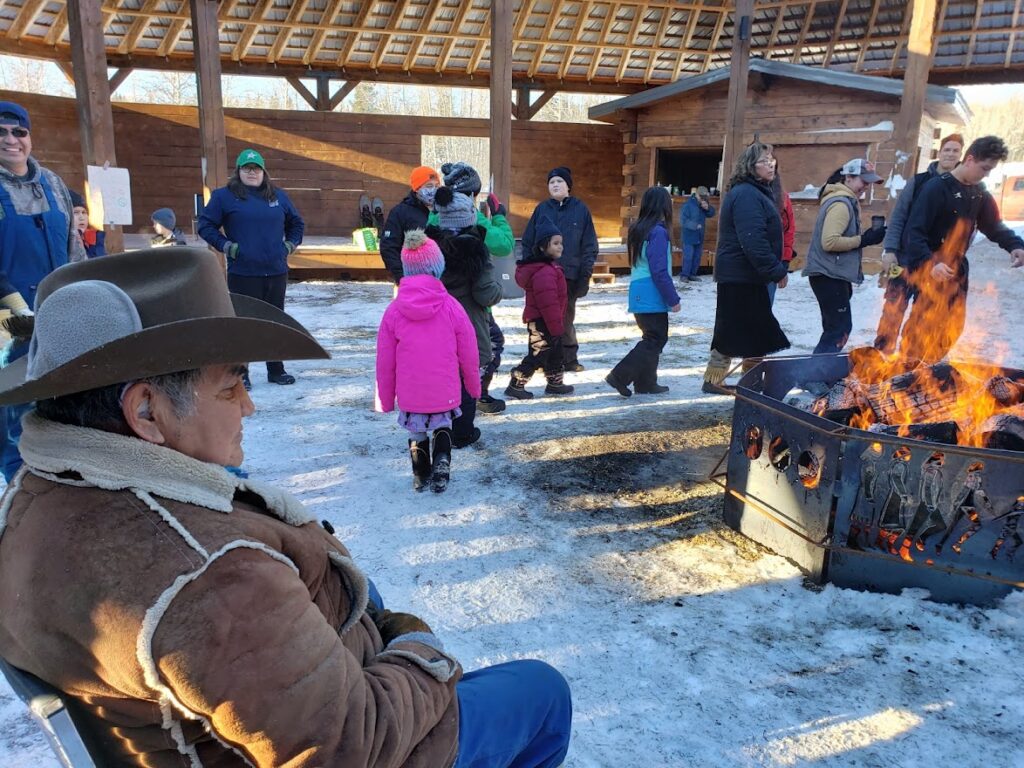
On Thursday, January 13th, The Cultural Heritage Department organized an exciting afternoon event for members and staff to learn more about, and celebrate, the community’s culture. The weather cooperated, providing beautiful sunshine and mild temperatures. There were many youth in attendance as well as a good mix of adults and Elders who were eager and excited to join in this community event.
For the full story on this event and more pictures, please click here.
National Day Truth and Reconciliation Day, September 30
Fort St. John marks first National Day for Truth and Reconciliation
Several hundred Fort St. John residents joined in Centennial Park on Thursday to mark the first National Day for Truth and Reconciliation in Canada.Sep 30, 2021 5:15 PM By: Tom Summer Alaska Highway News
Several hundred Fort St. John residents joined together in Centennial Park on Thursday to mark the first National Day for Truth and Reconciliation in Canada.
The new federal statutory holiday recognizes the legacy of Canada’s residential schools, and to honour lost children and survivors.
Ceremonies at Centennial Park began with drumming and an opening prayer, followed by a walk around the city’s recreational campus along 100 Street, 93 Avenue, 96 Street, and 96 Avenue.
Connie Greyeyes, the Northern Case Manager for the Indian Residential School Survivors Society, led the event and said the day is about more than just wearing orange shirts.
“It’s about working toward a better future for our children, and recognizing what a privilege it is for parents to be able to take your child to school, and pick them up and bring them home,” said Greyeyes. “Almost every single indigenous person you may know in your life is affected by intergenerational trauma of residential schools and day schools.”
Read the rest of the article and see more pictures of the event in the Alaska Highway News here.
The Story of Orange Shirt Day (now National Day for Truth and Reconciliation)
The article below has been copied from The Orange Shirt Society website.
Orange Shirt Day is a legacy of the St. Joseph Mission (SJM) Residential School (1891-1981) Commemoration Project and Reunion events that took place in Williams Lake, BC, Canada, in May 2013. This project was the vision of Esketemc (Alkali Lake) Chief Fred Robbins, who is a former student himself. It brought together former students and their families from the Secwepemc, Tsilhqot’in, Southern Dakelh and St’at’imc Nations along with the Cariboo Regional District, the Mayors and municipalities, School Districts and civic organizations in the Cariboo Region.
The events were designed to commemorate the residential school experience, to witness and honour the healing journey of the survivors and their families, and to commit to the ongoing process of reconciliation. Chief Justice Murray Sinclair challenged all of the participants to keep the reconciliation process alive, as a result of the realization that every former student had similar stories.
Orange Shirt Day is a legacy of this project. As spokesperson for the Reunion group leading up to the events, former student Phyllis (Jack) Webstad told her story of her first day at residential school when her shiny new orange shirt, bought by her grandmother, was taken from her as a six-year old girl.
The annual Orange Shirt Day on September 30th opens the door to global conversation on all aspects of Residential Schools. It is an opportunity to create meaningful discussion about the effects of Residential Schools and the legacy they have left behind. A discussion all Canadians can tune into and create bridges with each other for reconciliation. A day for survivors to be reaffirmed that they matter, and so do those that have been affected. Every Child Matters, even if they are an adult, from now on.
The date was chosen because it is the time of year in which children were taken from their homes to residential schools, and because it is an opportunity to set the stage for anti-racism and anti-bullying policies for the coming school year. It is an opportunity for First Nations, local governments, schools and communities to come together in the spirit of reconciliation and hope for generations of children to come.
It all started right here in the Cariboo, and as a result, School District No. 27 was chosen by the First Nations Education Steering Committee (FNESC) to pilot curriculum changes for all Grade 5 and Grade 10 students reflecting the residential school experience, which have now been implemented province-wide.
Resolutions have been passed in support of Orange Shirt Day by local governments, school districts, and First Nations in the Cariboo and beyond. The AFN Chiefs-in-Council passed a resolution declaring Orange Shirt Day “a first step in reconciliation”, and pledging to bring the message home as well as to the government of Canada and the churches responsible, several provincial governments have proclaimed Orange Shirt Day, and in March of 2019, the Government of Canada passed a bill designating September 30th National Truth and Reconciliation Day. Unfortunately, that bill died in the Senate.
On this day of September 30th, we call upon humanity to listen with open ears to the stories of survivors and their families, and to remember those that didn’t make it.
Every Child Matters Vigil, June 4, 2021

On June 4, 2021, Connie Greyeyes, of the Indian Residential School Survivors Society worked with Helen Knott to coordinate a vigil to remember the 215 school children who never made it home from the Kamloops Residential School. Doig River First Nations drummers performed at the event, attended by a large crowd of both Indigenous and non-Indigenous community members and neighbours.
“We’re going to give people the opportunity to speak from the heart about their feelings towards both non-Indigenous and Indigenous.”
Greyeyes says for non-Indigenous people, this is an important learning opportunity.
“Not only are non-Indigenous people grieving these children who have been found, but they’re also grieving this notion of Canada being the immaculate, incredible nation, and to find out there are some dark secrets. A huge majority of Canadians are utterly shocked at what was found, and they’re going to have to re-evaluate their thoughts about the residential school.”
While the wounds touch so many people, Greyeyes believes there’s a reason those children were found when they were.
“Now, it’s time to process and learn and grow from it. Maybe some people can see when they see people that are deep in trauma, that are dealing with addictions, that are on the street homeless, they can empathize and understand that this is a direct result of intergenerational trauma that occurred to all Indigenous people across this land.” (Source: Energetic City)
National Indigenous Peoples Day

June 21 is National Indigenous Peoples Day. This is a day for all Canadians to recognize and celebrate the unique heritage, diverse cultures and outstanding contributions of First Nations, Inuit and Métis peoples. The Canadian Constitution recognizes these three groups as Aboriginal peoples, also known as Indigenous peoples.
Although these groups share many similarities, they each have their own distinct heritage, language, cultural practices and spiritual beliefs.
In cooperation with Indigenous organizations, the Government of Canada chose June 21, the summer solstice, for National Aboriginal Day, now known as National Indigenous Peoples Day. For generations, many Indigenous peoples and communities have celebrated their culture and heritage on or near this day due to the significance of the summer solstice as the longest day of the year.
What led to the creation of National Indigenous Peoples Day?
“National Aboriginal Day (now National Indigenous Peoples Day) was announced in 1996 by then Governor General of Canada, Roméo LeBlanc, through the Proclamation Declaring June 21 of Each Year as National Aboriginal Day. This was the result of consultations and statements of support for such a day made by various Indigenous groups:
- in 1982, the National Indian Brotherhood (now the Assembly of First Nations) called for the creation of National Aboriginal Solidarity Day
- in 1995, the Sacred Assembly, a national conference of Indigenous and non-Indigenous people chaired by Elijah Harper, called for a national holiday to celebrate the contributions of Indigenous Peoples
- also in 1995, the Royal Commission on Aboriginal Peoples recommended the designation of a National First Peoples Day
On June 21, 2017, the Prime Minister issued a statement announcing the intention to rename this day National Indigenous Peoples Day.” (Source: Federal Government of Canada)
Canada Day
Our Nation enjoys participating in Fort St. John’s Canada celebration by partaking in the parade and festivities – it’s the perfect opportunity to celebrate with the City and provide education about Beaver culture and traditions to the broader community.
